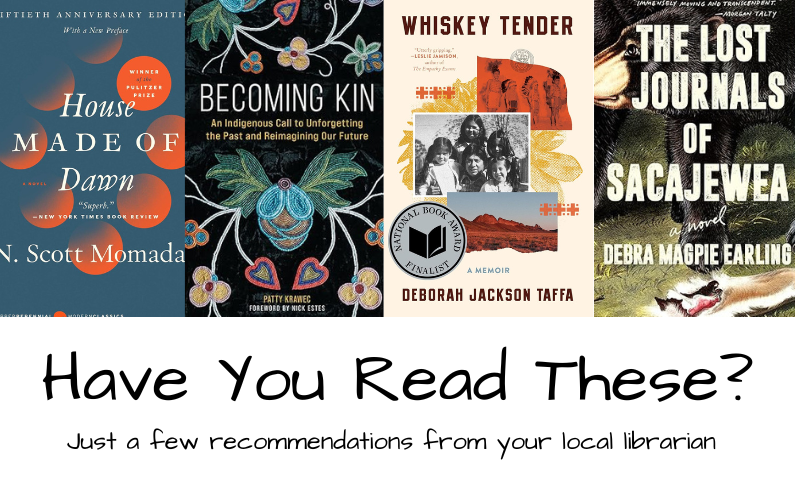Food! Cookbooks
Original Local: Indigenous Foods, Stories, and Recipes from the Upper Midwest by Heid E Erdrich (2013)
Erdrich writes with humor and warmth as she pairs local family gathering stories with recipes using pre-colonial ingredients. If you celebrate Thanksgiving, there are delicious ways to incorporate manoomin (wild rice) into just about anything. While focusing on traditional native foods; corn, squash, sunflowers, trout, and manoomin, Erdrich allows room for “regular” pantry items so one does not feel too stressed about drifting a bit from pre-colonial food.
The Sioux Chef’s Indigenous Kitchen by Sean Sherman (2017)
Turtle Island: Foods and Traditions of the Indigenous Peoples of North America by Sean Sherman (Nov 11, 2025)
Sherman is a James Beard awarded chef, an indigenous foodways advocate and founder of the Indigenous Food Lab in Minneapolis. There’s no better way to understanding a culture than reading and cooking through its traditions. Sherman celebrates a variety of indigenous nations with stories behind eating with the seasons and focusing on plant-forward dishes. Once you’ve cooked, consumed, and shared some of Sherman’s plates, take a trip to Minneapolis and treat your family to dinner at his restaurant!
Classic Novels
House Made of Dawn: A Novel by N. Scott Momaday (1968)
Winner of the 1969 Pulitzer Prize and referred to as a break through novel for American Indian writers, Momaday’s story includes many of the tragic themes current native writers are addressing. Returning from World War II to his home in New Mexico, Abel is plagued by walking in two worlds, the seasonal rhythm of his ancestry and the modern, industrial American norms. Seeking to find home, both spiritually and physically, defines Abel’s struggles and resolutions.
Ceremony by Leslie Marmon Silko (1977)
Silko began writing in the 1970s and was quickly recognized as brilliant with a genius award by the MacArthur Foundation. Ceremony follows Tayo after his return to his reservation after surviving the horrors of captivity as a prisoner of the Japanese during World War II. Drawn to his Indian past and its traditions, his search for comfort and resolution becomes a ritual–a curative ceremony that defeats his despair.
Philosophy & World View
Becoming Kin: An Indigenous Call to Unforgetting the Past and Reimagining Our Future by Patty Krawec (2025)
Krawec writes to dismantle and connect the histories written by settlers and those stories told by native people in North America. She asks, “What would it look like to remember that we are all related? How might we become better relatives to the land, to one another, and to indigenous movements of solidarity?”
Thunder Song: Essays by Sasha taqseblu La Pointe (2024)
An unapologetically punk dive into indigenous identity, stereotypes, cultural displacement, and environmental degradation, La Pointe’s collection is a voice for the next generation of native people claiming a bigger role in the United States as professionals, artists, activists, policy makers, and leaders.
Memoir
Whiskey Tender: A Memoir by Deborah Jackson Taffa (2024)
Taffa tells the story of her family as she comes of age in the 1970s and 1980s, moved off the reservation to a community divided by natives trying to be model minorities and those stubbornly holding onto traditional ways. While her story itself is compelling, it is Taffa’s writing that draws you in so close, it is hard to stop reading. Again, the existential crisis of belonging in two worlds is forefront as a theme.
The Lost Journals of Sacajewea: A Novel by Debra Magpie Earling
Earling was asked by the Lewis and Clark Museum to write about their journey. Considering this task, the voice of Sacajewea kept whispering to Earling. So, not a true memoir, but an imagined one, The Lost Journals is a powerful telling of a young woman’s survival during a historically transformative time for her people. Earling intertwines streaming consciousness, dreams remembered, poetry, song to create a unique language for Sacajewea that truly communicates an experience we can only imagine.

